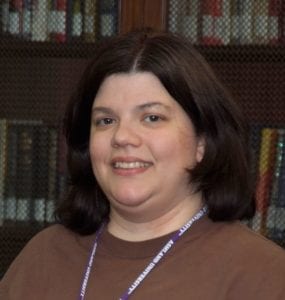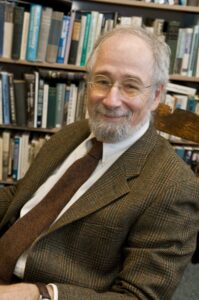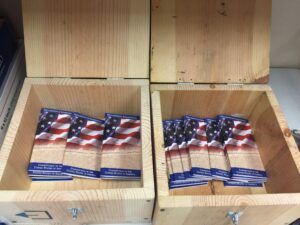Kelly Eddy, a 2015 graduate of Ashland University’s Master of Arts in American History and Government degree program, teaches Advanced Placement US history at Winston Churchill High School in Livonia, Michigan, a western suburb of Detroit. Since the 2008 recession, the school’s performing arts magnet program has attracted students from underfunded schools in Detroit, as well as immigrant Chinese and Middle Eastern students. Eddy, who has demanded students’ best efforts during her 20 years at Churchill, has had to adapt her teaching style.
Ambitious students are now taking AP classes they are not ready for. “They need extra support. With many parents working an extra job, the students are alone more. So I have to explain: ‘Here is what you must do to be successful.’”
Last year Eddy seized a chance to give several students a push. The Henry Ford Museum—where Eddy researched her Master’s thesis on the founder of the auto company—asked her to bring four students to a workshop offered by the Shoah Foundation. Eddy drove four bright students to Dearborn, Michigan, where they participated in an “IWitness” event. They watched filmed interviews of Holocaust survivors and constructed “found poems” from these elderly witnesses’ moving words. As an TAH-educated teacher, Eddy had prepared her students to deal with primary sources. They responded thoughtfully to the films.
“High school kids spending a day of summer going to school—that’s impressive,” Eddy thought, as she and her students were leaving. “Then a Shoah Foundation filmmaker asked if my students would stay to be interviewed.” They stayed.
Later, Eddy and her students were invited to a Shoah Foundation gala at the Ford museum, where philanthropist Bill Ford would be honored. Students donned their best clothes and climbed in a limo that whisked them back to Dearborn. They were in a private room, reviewing their poems from the summer workshop, when “in walked filmmaker Steven Spielberg, founder of the Shoah organization, who sat and talked with them.”
“Then the students mingled with the VIP guests, talking about their experience with IWitness. I watched as they met actors Steve Carell and Halle Berry.” At dinner, a promotional video was shown, and Eddy was surprised to find her students the stars of the film.
Later, the Foundation emailed Eddy about their student ambassador program. Eddy urged Brandon, a gifted student who’d been featured prominently in the video to apply. First she warned him: “If you’re not going to take this seriously, don’t do it. Brandon was a natural leader who at times goofed off. But he was selected as an ambassador, one of four students outside the state of California.” Through the program, he interviewed several Detroit area Holocaust survivors and one survivor of the 1994 Rwandan genocide.
Eddy watched Brandon change. “He gained empathy—he began standing up for others—plus self-esteem and a sense of responsibility. He realized it wasn’t just his name on the line, it was mine, also.” The student now studies at Central Michigan University.
The TAH Master’s program helped Eddy enlarge her expectations of students. “In every MAHG class, teachers discuss and interpret primary sources. Now I put those documents in students’ hands: to teach critical thinking skills and to allow them to learn directly from the past.”
“The way the TAH professors teach through discussion changed my own approach. I lecture less now,” Eddy says, admitting this involves risk. TAH Teachers prepare well for MAHG classes, and discussions are rich. But in high school, “if the kids haven’t done the reading, discussion will fall flat. Then I say, ‘Well, we’ve lost the chance to discuss this. You’re still responsible for it on the test, but we’re moving on to something else.’ The AP curriculum doesn’t allow us to slow down. But students can learn from mistakes as well as triumphs.”
You can view the video featuring Eddy’s students at the link below. The student who reads his poem near the beginning of the film, Brandon Bartley, was selected as a student ambassador for the Shoah Foundation.
https://www.youtube.com/watch?v=3dlqxOButic




